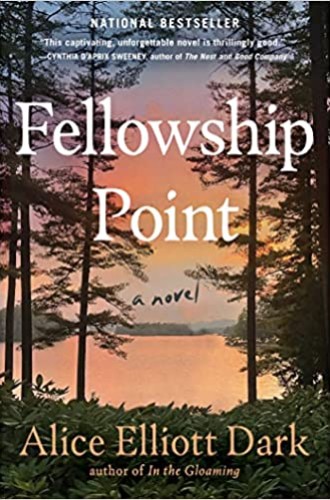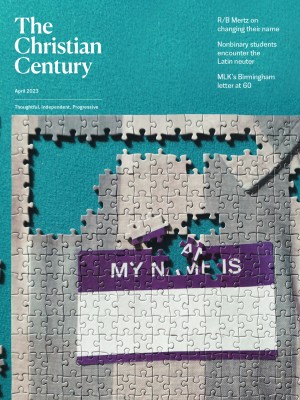A complex story of relationships and religion
The protagonist of Alice Elliott Dark’s novel gives readers the flawed heroine they crave.
Writers of beloved children’s books hold a special place in the hearts of readers. The creator of a fictional revered figure of this kind, then, has a difficult task: how to make the character worthy of admiration, yet not so perfect that readers can’t relate to her. In Agnes Lee, the protagonist of Alice Elliott Dark’s novel Fellowship Point, readers get the flawed heroine they crave.
Agnes is the octogenarian author and illustrator of a famous series of children’s books about a girl named Nan and her adventures, spanning from the 1965 When Nan Was a Lobsterman to the recent When Nan Ran a Wind Farm. Nan has become the subject of many theses, a “proto-feminist icon of interest on campus” because she is written “as if equality were a fact.” Agnes is also secretly the author, under the pseudonym Pauline Schulz, of a series of best-selling satirical novels about five women friends, novels that seek to “reveal what a particular person was bound to do under explicit circumstances.” As the story unfolds, she ponders whether to take up another genre and write a memoir.
Read our latest issue or browse back issues.
Agnes and her lifelong best friend, Polly Wister, are both scions of monied Philadelphia Quaker gentry. They are two of the heirs, along with an odious cousin, Archie Lee, from the original five families who set up the compact to have a summer community on the Maine peninsula known as Fellowship Point, which includes a wildlife sanctuary that was once held sacred by its Native American inhabitants. The disposition of this land upon the eventual deaths of Agnes and Polly sets up a good deal of the drama in the plot. Should it be left to a land trust for preservation or enabled to be developed? Are the land’s original Abenaki inhabitants and caretakers entitled to a say in its future, although they were stripped of that right in the past? Will rapacious real estate developers take control before they can be stopped?
Holding to their ideals, the Quaker forebears who established Fellowship Point—and who appear in many of the novel’s flashback scenes—posit that the Declaration of Independence was right to say “that everyone is responsible for his fellow man and woman, but what did that entail?” The question of how to balance that responsibility with the Quaker position that it’s “always better not to draw undue attention” is one of the main themes of the book.
Other questions related to religion arise in the narrative, from Agnes’s derivation of her pseudonym from the apostle Paul to her sister Elspeth’s religious vocation. Elspeth, who becomes the equivalent of a lay nun, has ecstatic visions which Agnes writes down, seeing in them “a quality of truth that is recognizable even if it’s alien to one’s own experience.” Agnes sees her own writing as “a method of thinking that reliably moves me forward,” viewing it almost as a devotion.
I read and discussed this book with a group of women in academia, and although almost all of us were in thrall to the writing, characters, and plot, we agreed that there are too many extraneous subplots. Some of them are based on rather flimsy pretexts and feel like distractions, even while they serve a purpose in developing character. For example, one character is jailed for no apparent purpose other than to allow Polly’s husband, Dick, to write letters that show him to be a little less of a dick than he otherwise appears in the novel. In a book where fires and sudden deaths of young people fuel the plot, however, this is a small quibble.
Dark, whose earlier novel and two short story collections have been well received, teaches creative writing at Rutgers-Newark. The many years that this master craftswoman of a writer spent working on Fellowship Point are on display in the richness and depth of the characters and their milieu. Dark’s descriptions of Maine and Philadelphia make the two locales seem like characters in their own right.
Fellowship Point is that rare novel that dares to tell a complex story of relationships as they unfold over the span of many years while at the same time discussing the ideas and controversies that shape the lives of the characters and their families. To say what the book is about limits the scope of its pleasures, which are wide-ranging. In short, this is one of the best books I have read in quite a while.






